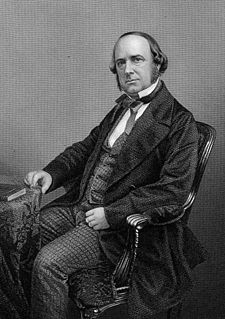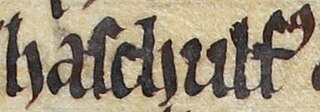
Gerald of Wales was a Cambro-Norman archdeacon of Brecon and historian. As a royal clerk to the king and two archbishops, he travelled widely and wrote extensively. He studied and taught in France and visited Rome several times, meeting the Pope. He was nominated for several bishoprics but turned them down in the hope of becoming Bishop of St Davids, but was unsuccessful despite considerable support. His final post was as Archdeacon of Brecon, from which he retired to academic study for the remainder of his life. Much of his writing survives.
Billy "King Rat" Wright was an Ulster loyalist paramilitary leader during the Troubles in Northern Ireland. He joined the Ulster Volunteer Force (UVF) in his hometown of Portadown around 1975. After spending several years in prison, he became a born again Christian preacher. Wright resumed his UVF activities around 1986 and became commander of its Mid-Ulster Brigade in the early 1990s, taking over from Robin "the Jackal" Jackson. According to the Royal Ulster Constabulary, Wright was involved in the sectarian killings of up to 20 Catholics, although he was never convicted for any. It has been alleged that Wright, like his predecessor, was working with RUC Special Branch.

Thomas Wright was an English antiquarian and writer.
Honorius was a member of the Gregorian mission to Christianize the Anglo-Saxons from their native Anglo-Saxon paganism in 597 AD who later became Archbishop of Canterbury. During his archiepiscopate, he consecrated the first native English bishop of Rochester as well as helping the missionary efforts of Felix among the East Anglians. Honorius was the last to die among the Gregorian missionaries.
Sir Thomas Adams's Professor of Arabic is a title used at Cambridge University for the holder of a professorship of Arabic; Sir Thomas Adams, 1st Baronet (1586–1668), Lord Mayor of London in 1645, gave to Cambridge University the money needed to create the first Professorship of Arabic.
John, Johnny, or Johnnie Wright may refer to:
William, Will, or Bill Wright may refer to:

Mabel Esmonde Cahill was an Irish female tennis player, active in the late 19th century, and was the first foreign woman to win a major tennis tournament when she won the 1891 US National Championships.

Conel Hugh O'Donel Alexander, known as Hugh Alexander and C. H. O'D. Alexander, was an Irish-born British cryptanalyst, chess player, and chess writer. He worked on the German Enigma machine at Bletchley Park during the Second World War, and was later the head of the cryptanalysis division at GCHQ for 25 years. He was twice British chess champion and earned the title of International Master.

"Adam lay ybounden", originally titled Adam lay i-bowndyn, is a 15th-century macaronic English Christian text of unknown authorship. It relates the Biblical events of Genesis, Chapter 3 on the Fall of Man.

Island Bridge is a road bridge spanning the River Liffey, in Dublin, Ireland and joining the South Circular Road to Conyngham Road at the Phoenix Park.

Ascall mac Ragnaill meic Torcaill, also known as Ascall Mac Torcaill, was the last Norse-Gaelic king of Dublin. He was a member of the Meic Torcaill, a Dublin family of significance since the early twelfth century.
The 1890 Home Nations Championship was the eighth series of the rugby union Home Nations Championship. Six matches were played between 1 February and 15 March. It was contested by England, Ireland, Scotland and Wales.
James Fleetwood was an English clergyman and Bishop of Worcester.

Henry Bruce Wright Armstrong was a Northern Irish barrister and politician, Unionist Member of Parliament (MP) for Mid Armagh from June 1921 until 1922.
Thomas Fletcher was an 18th-century Anglican bishop in Ireland.
Charles Jackson was an 18th-century Anglican bishop in Ireland.

Joseph Proctor was an academic of the University of Cambridge in the 18th and 19th centuries.
The Cambridge Shakespeare is a long-running series of critical editions of William Shakespeare's works published by Cambridge University Press. The name encompasses three distinct series: The Cambridge Shakespeare (1863–1866), The New Shakespeare (1921–1969), and The New Cambridge Shakespeare (1984–).
Samuel Rastall (1749–1781) was an Anglican priest in Ireland in the Eighteenth Century.
This page is based on this
Wikipedia article Text is available under the
CC BY-SA 4.0 license; additional terms may apply.
Images, videos and audio are available under their respective licenses.








